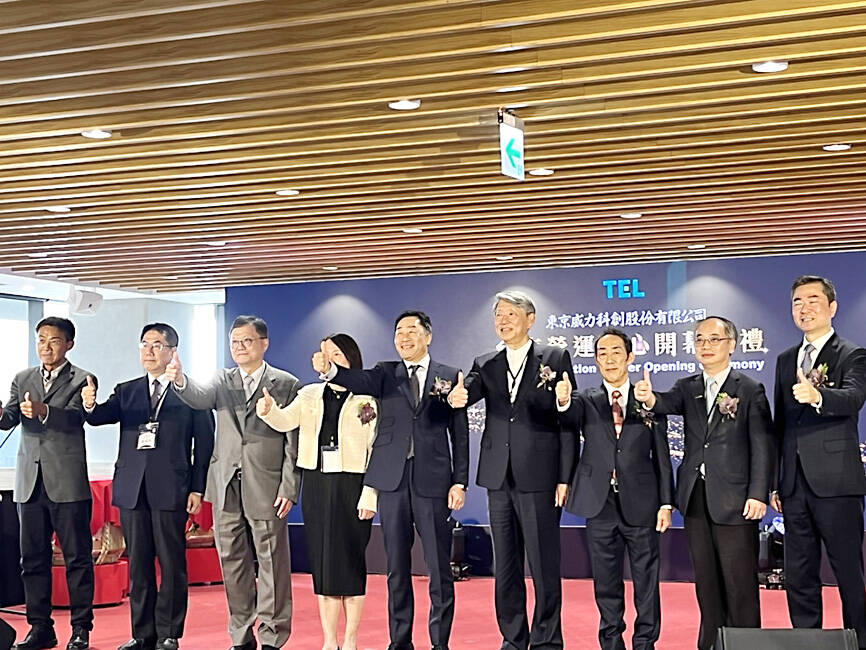Tokyo Electron Ltd, Asia’s biggest semiconductor equipment supplier, yesterday launched a NT$2 billion (US$61.5 million) operations center in Tainan as it aims to expand capacity and meet growing demand.
Its new Taiwan Operations Center is expected to help customers release their products faster, boost production efficiency and shorten equipment repair time in a cost-effective way, the company said.
The center is about a five-minute drive from the factories of its major customers such as Taiwan Semiconductor Manufacturing Co’s (TSMC, 台積電) advanced 3-nanometer and 2-nanometer fabs.

Photo: Grace Hung, Taipei Times
The operations center would have about 1,000 employees when it is fully utilized, the company said.
TSMC vice president T.S. Chang (張宗生), who oversees advanced technology and mask engineering, attended the center’s opening ceremony, along with United Microelectronics Co (聯電) and Winbond Electronics Corp (華邦電) representatives.
“With the opening of this operations center, we aim to reach two goals: First, we aim to expand our scale to cope with the ongoing growth of the Taiwanese market. Second, we hope to shorten the product repairing time cycle and to broaden the supply chain,” Tokyo Electron Taiwan Ltd chairman Hikaru Ito said at the ceremony.
The six-floor facility is comprised of a repair center and a testing lab to provide customers with one-stop services, as Taiwan plays a key role in the global artificial intelligence (AI) industry, Tokyo Electron Taiwan president Roger Chang (張天豪) said.
For the first time, the company can help fix vacuum transpiration robotic arms used in semiconductor equipment for customers in Taiwan, it said.
In the past, it took about seven months to complete the whole repair process in Japan, compared with one to two months now, it said.
The new repair center would also help customers fix damaged ovens used in lithography equipment, it said.
The company is mulling to build a more resilient supply chain in Taiwan through sourcing key parts locally, it said, adding that it has a shortlist of potential suppliers.
Taiwan has become the fourth-biggest market for the company, accounting for 13.3 percent of its total revenue in the second quarter, a spike from 9.3 percent a year earlier, a company financial statement showed.
The new operations center demonstrates the close partnership between Taiwan and Japan in the semiconductor field, Minister of Economic Affairs J.W. Kuo (郭智輝) said at the opening ceremony.

ELECTRONICS BOOST: A predicted surge in exports would likely be driven by ICT products, exports of which have soared 84.7 percent from a year earlier, DBS said DBS Bank Ltd (星展銀行) yesterday raised its GDP growth forecast for Taiwan this year to 4 percent from 3 percent, citing robust demand for artificial intelligence (AI)-related exports and accelerated shipment activity, which are expected to offset potential headwinds from US tariffs. “Our GDP growth forecast for 2025 is revised up to 4 percent from 3 percent to reflect front-loaded exports and strong AI demand,” Singapore-based DBS senior economist Ma Tieying (馬鐵英) said in an online briefing. Taiwan’s second-quarter performance beat expectations, with GDP growth likely surpassing 5 percent, driven by a 34.1 percent year-on-year increase in exports, Ma said, citing government

‘REMARKABLE SHOWING’: The economy likely grew 5 percent in the first half of the year, although it would likely taper off significantly, TIER economist Gordon Sun said The Taiwan Institute of Economic Research (TIER) yesterday raised Taiwan’s GDP growth forecast for this year to 3.02 percent, citing robust export-driven expansion in the first half that is likely to give way to a notable slowdown later in the year as the front-loading of global shipments fades. The revised projection marks an upward adjustment of 0.11 percentage points from April’s estimate, driven by a surge in exports and corporate inventory buildup ahead of possible US tariff hikes, TIER economist Gordon Sun (孫明德) told a news conference in Taipei. Taiwan’s economy likely grew more than 5 percent in the first six months

SMART MANUFACTURING: The company aims to have its production close to the market end, but attracting investment is still a challenge, the firm’s president said Delta Electronics Inc (台達電) yesterday said its long-term global production plan would stay unchanged amid geopolitical and tariff policy uncertainties, citing its diversified global deployment. With operations in Taiwan, Thailand, China, India, Europe and the US, Delta follows a “produce at the market end” strategy and bases its production on customer demand, with major site plans unchanged, Delta president Simon Chang (張訓海) said on the sidelines of a company event yesterday. Thailand would remain Delta’s second headquarters, as stated in its first-quarter earnings conference, with its plant there adopting a full smart manufacturing system, Chang said. Thailand is the firm’s second-largest overseas

SUPPLY RESILIENCE: The extra expense would be worth it, as the US firm is diversifying chip sourcing to avert disruptions similar to the one during the pandemic, the CEO said Advanced Micro Devices Inc (AMD) chief executive officer Lisa Su (蘇姿丰) on Wednesday said that the chips her company gets from supplier Taiwan Semiconductor Manufacturing Co (TSMC, 台積電) would cost more when they are produced in TSMC’s Arizona facilities. Compared with similar parts from factories in Taiwan, the US chips would be “more than 5 percent, but less than 20 percent” in terms of higher costs, she said at an artificial intelligence (AI) event in Washington. AMD expects its first chips from TSMC’s Arizona facilities by the end of the year, Su said. The extra expense is worth it, because the company is